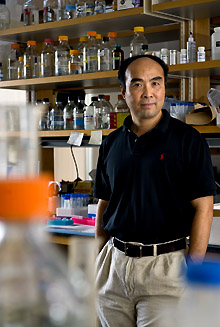Scientist Explores How Genes Guide Organ Formation
In his lab in the Merryl and Sam Israel Jr. Environmental Sciences Building, YiPing Chen leads a team of 11 researchers, including postdoctoral fellows, graduate students, undergraduates and technicians, exploring how certain genes control the growth of organs in animals.

YiPing Chen is back in the laboratory on the Tulane uptown campus after a two-year absence. He is chair and professor of cell and molecular biology. (Photo by Paula Burch-Celentano)
“We mainly focus on craniofacial development,” says Chen. “We work on how genes control tooth formation and how genes control palate formation. And most recently we shift a little bit to the development of the temporomandibular joint (TMJ) or jaw joint.”
Chen, chair and professor of cell and molecular biology, first came to Tulane in 1997. In the wake of Hurricane Katrina, he left in 2006 to join the faculty at Ohio State University. He returned to Tulane this fall to the School of Science and Engineering to continue his teaching and research.
“I like the collegial and friendly environment at Tulane,” says Chen. “And I feel New Orleans is my home.”
As most dentists are aware, if a tooth is knocked out, it can regrow, if re-implanted. Chen is taking the regeneration of teeth a step further as he investigates whether mice skin cells can become mice tooth cells, hoping to translate the work to human skin and teeth.
“So you don't have to have your tooth to make a tooth. You can take skin cells at least that is the hope to make a tooth regrow,” says Chen. “I'm really excited about that project because imagine if you take a human skin cell and make a tooth or tooth cells.”
In his work on the temporomandibular joint, commonly referred to as TMJ, Chen is studying how the information in genes is used in the normal development of the jaw joint in order to understand how changes in gene expression lead to abnormal development that results in inflammation and discomfort. The jaw joint connects the lower jaw to the skull. According to Chen, 17 percent of Americans suffer from TMJ disorder.
Chen also is collaborating with Ken Muneoka, Tulane professor of cell and molecular biology, on the regeneration of limbs. They are working on a joint project in which Muneoka is studying regeneration or regrowth of limbs. Muneoka is looking at whether in the case of amputated limbs, genes can be stimulated to signal the regrowth of a limb.
Chen's part of the limb-regeneration project involves in how genes control the regeneration of a joint in a regenerated limb.
